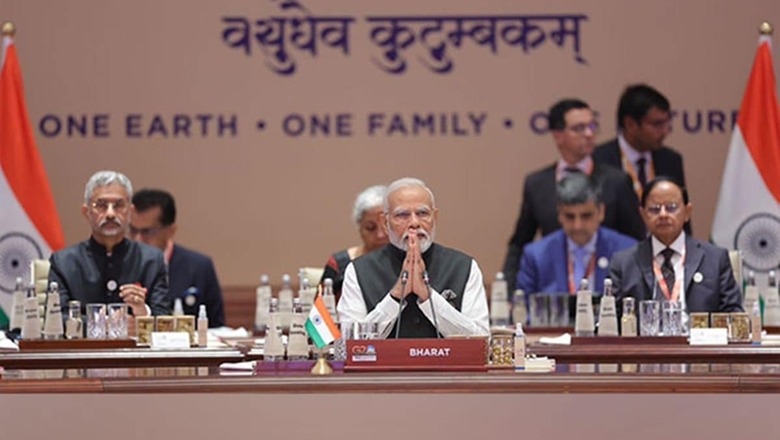
views
The Narendra Modi government has successfully handled the Delhi G20 Summit, demonstrating high standards of diplomacy, leadership and determination to address pressing global challenges. The Summit under Bharat’s presidency marked a major milestone in this forum’s history with the unanimous adoption of the Delhi Declaration and many other achievements.
One of the most notable achievements of Bharat’s G20 presidency has been the expansion of the forum. Bharat has successfully engaged the African Union (51-member countries) as a permanent member, in the discussions, transforming G20 into G21. This much needed expansion allowed for a more comprehensive and diverse representation of the world’s nations, increasing the inclusiveness and effectiveness of the Summit.
Unlike the previous G20 Summit held in Bali, which was largely centred around the Ukraine-Russia conflict, Bharat has managed to steer the discussions towards critical global issues such as terrorism, climate change, cryptocurrencies, economic cooperation, space science and so on. In doing so, Bharat has demonstrated its commitment to addressing contemporary challenges affecting people across the globe.
Adopted with 100 per cent global consensus, the G20 Delhi joint declaration symbolised the success of Prime Minister Modi’s call for a more human-centred approach to globalisation. Bharat’s ability to bring leaders from diverse backgrounds and ideologies into a united front for a declaration highlighted the nation’s diplomatic prowess and its growing influence on the global stage. Bharat’s G20 presidency has become more than just a diplomatic event; it evolved into a people-driven movement. Critics may have questioned his approach, but the fruits of the effort were evident during the ongoing Summit in the national capital.
One of the notable aspects of Bharat’s chairmanship of the G20 was the concise nature of the Delhi Declaration, of only 34 pages, which was in stark contrast to the voluminous 1,187-page Bali Declaration. This brief reflected Bharat’s commitment to clear and direct communication on the international stage and emphasised the country’s importance as a key global player.
While Prime Minister Modi and his trusted men, led by Dr S Jaishankar and Ajit Doval, interacted with heads of state from around the world and promoted international cooperation and partnership. Bharat’s efforts went beyond diplomacy and included initiatives such as the grand launch of the Global Biofuels Alliance and the historic “India-Middle East-Europe” economic corridor. This ambitious project is expected to revolutionise trade between India and Europe and reduce transit time by up to 40 per cent. The corridor not only has the potential to boost economic growth, but also to enhance geopolitical stability by promoting stronger economic ties between regions. The India-Middle East-Europe Economic Corridor is moving along a course paved with shared dreams and is emerging as a beacon of cooperation, innovation and collective progress. As history unfolds its pages, let this corridor stand as a testament to human determination and global unity.
During the first day of G20 Summit in Delhi, Bharat placed considerable emphasis on showcasing its rich cultural heritage. From a morning visit to the Konark Sun Temple to a historic dinner at the great ancient Nalanda University, the Modi government highlighted the cultural treasures of the nation and its contribution to the global civilisation of knowledge. A renowned centre of learning from the 4th to the 11th century, Nalanda University symbolised Bharat’s historic commitment to education and the dissemination of knowledge. The exchange between US President Joe Biden and other world leaders with Prime Minister Modi about the Nalanda University exemplified Bharat’s pride in its heritage and its efforts to promote cultural appreciation and cooperation on the world stage.
This year’s hundreds of G20 meetings were held across the length and breadth of the nation. India’s main focus during its G20 presidency has been to approach global challenges with a human-centred perspective. This commitment was evident in the discussions and joint declaration adopted during the first day of the Summit itself.
Amid the splendour of Delhi, Bharat’s G20 presidency unfolded as a monumental triumph. With leaders from around the world converging in unity, Bharat rang out a message: The world must march forward, guided by the compass of people-centric policies. In the spirit of the wisdom of Prime Minister Modi’s timeless statement — “This is not the era of war” — Bharat’s G20 leadership will go down in history as a turning point in its diplomatic journey that has brought human civilisation to a brighter and more enlightened era.
Through a symphony of global cooperation and unity, Prime Minister Modi’s mantra of “Sabka Saath, Sabka Vikaas, Sabka Vishwas, Sabka Prayas” has transcended borders and become a beacon of shared progress that unites hearts and nations across the globe.
Amarjeet Verma is a policy researcher and writer. Views expressed in the above piece are personal and solely that of the author. They do not necessarily reflect News18’s views.
















Comments
0 comment